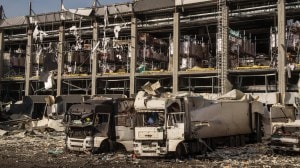A month after the RG Kar incident, Kolkata is a city at the barricades
The city has seen more than 300 major rallies over the last month, many of these midnight events organised by women, for whom the incident of August 9 had rudely challenged their faith in their city.
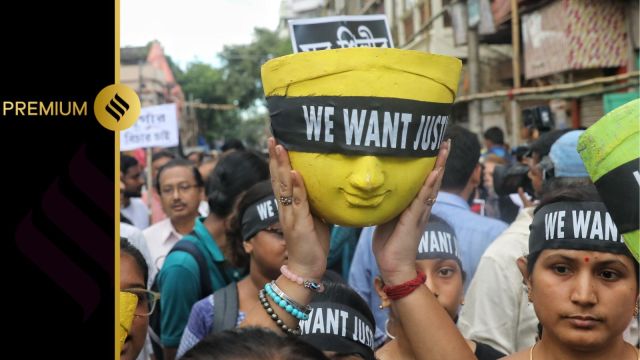 Artisans of Kumartuli and their family members along with citizen of Kolkata during a protest from Kumartuli demand Justice for RG Kar victims in Kolkata on Sunday, September 08, 2024. (Express photo by Partha Paul)
Artisans of Kumartuli and their family members along with citizen of Kolkata during a protest from Kumartuli demand Justice for RG Kar victims in Kolkata on Sunday, September 08, 2024. (Express photo by Partha Paul)Everywhere in Kolkata, there are barricades – the mini barricades that can easily be jumped over in markets and street corners, the formidable 7-foot-tall barricades in front of government buildings, and the bamboo barricades that no one takes seriously.
But during major rallies, even the most formidable of these barricades come down – as has happened several times since August 9, when the city rose in protest against the rape and murder of a doctor at R G Kar Hospital.
The city has seen more than 300 major rallies over the last month, many of these midnight events organised by women, for whom the incident of August 9 had rudely challenged their faith in their city. Kolkata now is a city that’s standing vigil, pushing against the barricades.
On September 9, Chief Minister Mamata Banerjee chastised the protesters for not going home. “If you are out on the roads every night protesting, a lot of people get disturbed too…It has been more than a month, I would urge you to return to festive spirit,” she said at a meeting. The irony of the Chief Minister’s remarks wasn’t lost on anyone, coming as they did from someone whose road to power was paved with protests and demonstrations, from Singur to Nandigram and Lalgarh.
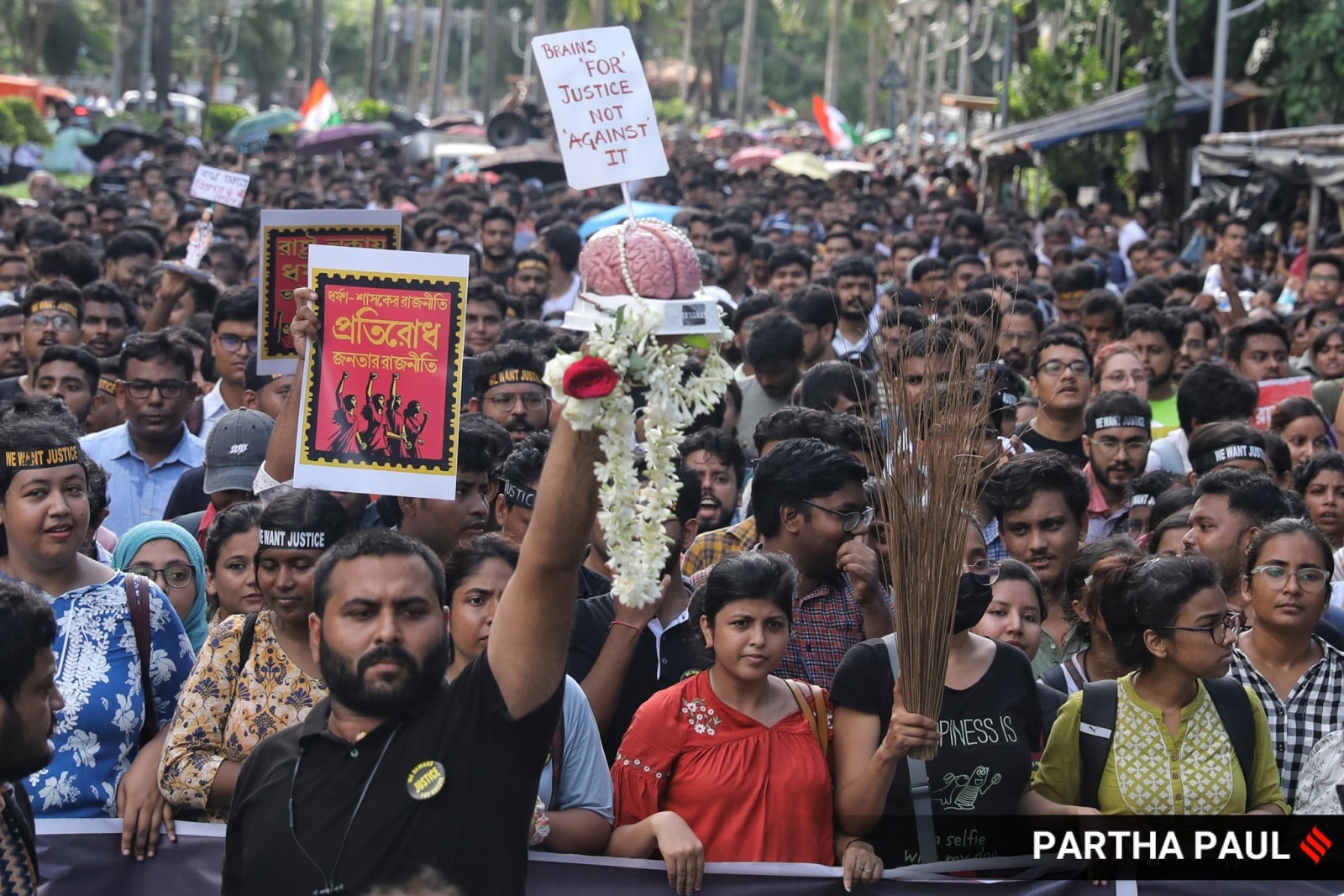 Junior Doctors during a protest rally to Swastha Bhavan in Saltlake, Kolkata in connection with rape and murder of a junior doctor in RG Kar medical college and hospital. (Express Photo)
Junior Doctors during a protest rally to Swastha Bhavan in Saltlake, Kolkata in connection with rape and murder of a junior doctor in RG Kar medical college and hospital. (Express Photo)
Though Kolkata has reclaimed the protest tag it earned during the Left era of 1990s, this time the anger is more visceral, real. The leisurely ‘Cholche na, Cholbe na’ (We won’t let this happen) that rang through the city every time the trade unions struck work has given way to a more urgent “Bichar Chai!’ (We want justice).
“It is the worst of times, it is the best of times for Kolkata,” says Prachetash Sammadar, 40, a financial consultant, of the spontaneous protests that have broken out across the city.
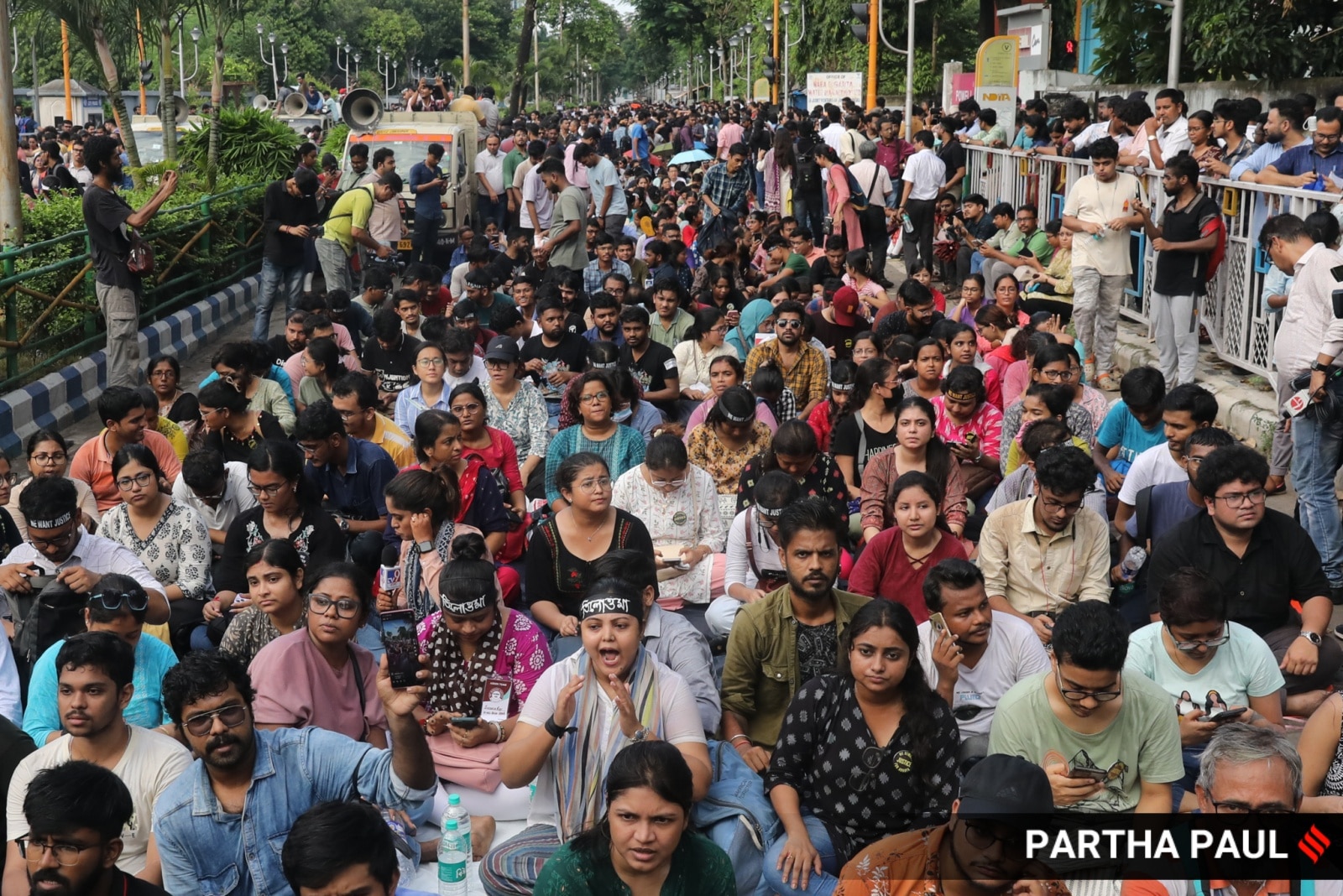 Though Kolkata has reclaimed the protest tag it earned during the Left era of 1990s, this time the anger is more visceral, real. (Express Photo)
Though Kolkata has reclaimed the protest tag it earned during the Left era of 1990s, this time the anger is more visceral, real. (Express Photo)
On September 8, his mother Mousumi Sammadar, 73, a retired school teacher, walked from South Kolkata’s Kalighat to Rashbehari Avenue, despite her aching knees. “She was not sure if she would be able to make it, but she did. My heart swells with pride and love when I see my mother and hundreds of other senior citizens of my city out there, walking mile after mile, raising their voices against the systemic wrong,” says Prachetash.
He claims these protests are unlike anything the city has seen before. “I have always known my mother to be a politically conscious woman. But for as long as I can remember, I have never seen her go out and be part of michil (protest marches),” he adds.
Abdul Razzaq, who owns a cosmetics stall in the bustling New Market area of Kolkata, one of the main shopping destinations in the city, is hoping the city will move on but doesn’t want people to forget.
 The city has seen more than 300 major rallies over the last month, many of these midnight events organised by women. (Express Photo)
The city has seen more than 300 major rallies over the last month, many of these midnight events organised by women. (Express Photo)
“People are not in the mood to shop at all. Usually, during this festive season, I earn around Rs 10,000 a day. But this time, I have barely earned half that amount. This weekend, sales picked up a bit and I am desperately hoping that the mood of the city shifts. But I also don’t want people to forget what happened. So I am feeling guilty,” says the 24-year-old.
Dipak Chatterjee, 57, a building contractor in North Kolkata’s Bangur Avenue, says it’s heartening that the protests have managed to stay largely apolitical. “As much as the ruling party would like to dismiss these protests as politically motivated, this is spontaneous and I haven’t seen anything like this before,” he says.
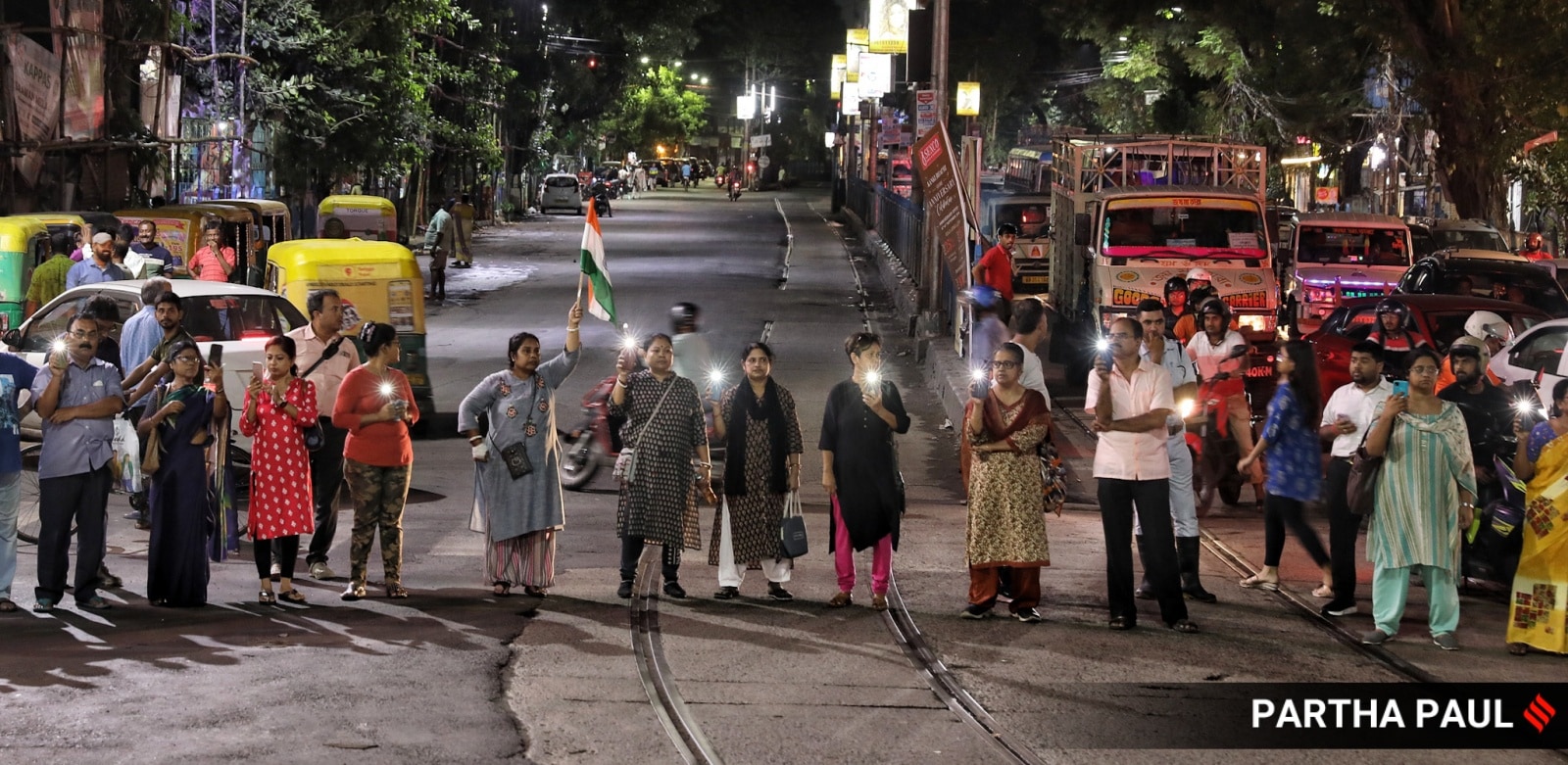 People hit the streets in Kolkata and other parts of the state to a call of protest against RG Kar Medical College rape and murder case from 9pm to 9pm and 9 mins (l (‘noi noi nio’ no no no in Bengali) . People use cell phone lights in Kankurgachi as part of the call. (Express Photo)
People hit the streets in Kolkata and other parts of the state to a call of protest against RG Kar Medical College rape and murder case from 9pm to 9pm and 9 mins (l (‘noi noi nio’ no no no in Bengali) . People use cell phone lights in Kankurgachi as part of the call. (Express Photo)
On September 4, a day before the scheduled hearing of the case in the Supreme Court (which was later postponed), Chatterjee visited RG Kar College at about 10 pm with his 20-year-old daughter to register his protest. There were thousands like him that night. “We were overwhelmed. Every street corner had a shrine. There were women taking out marches late into the night. I was glad I did this with my daughter,” he says.
South Kolkata’s Jadavpur 8B bus stand has been the protest hub for the past few weeks. From students to activists, hundreds of people have been squatting here and made it their home for the Reclaim the Night protests.
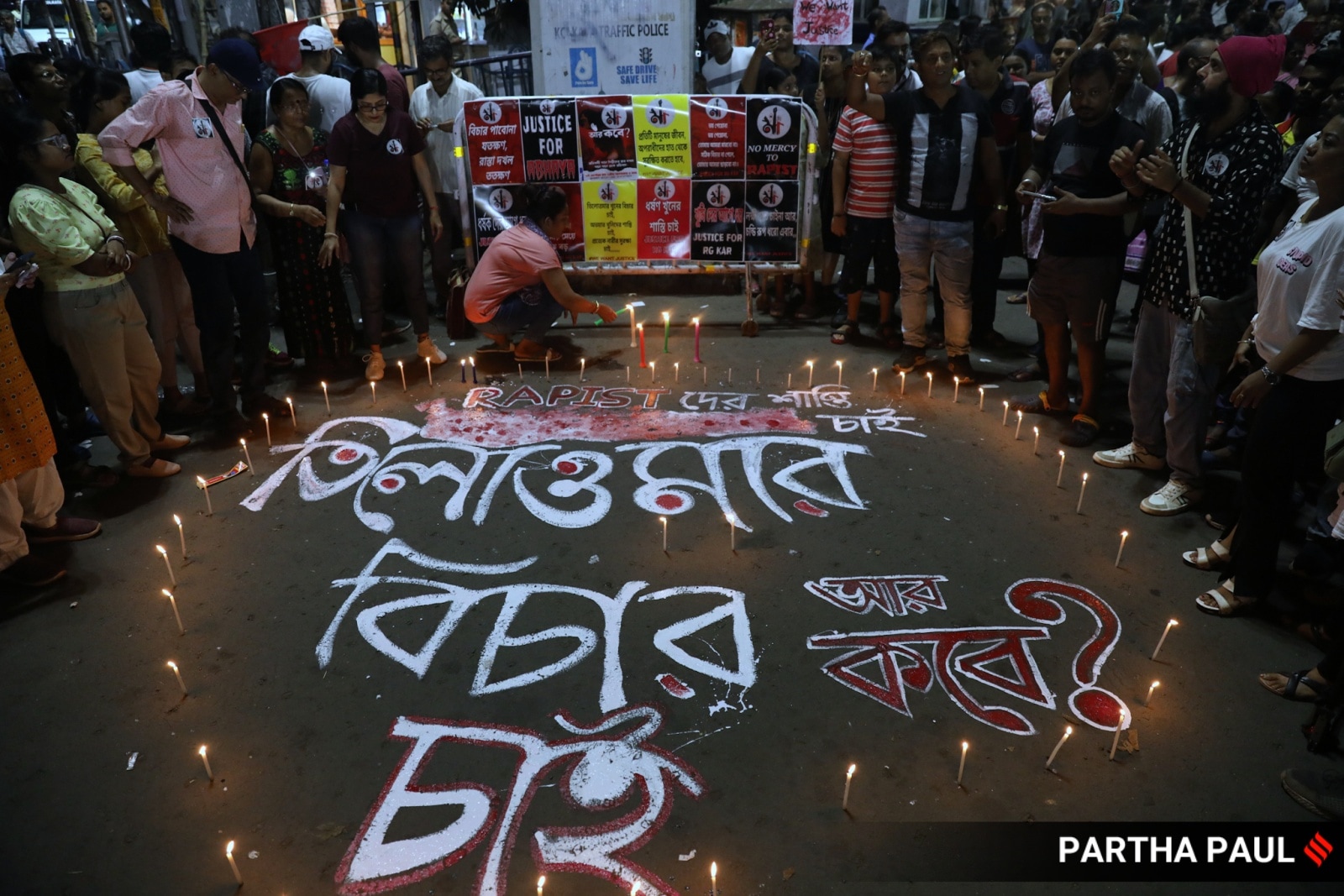 Reclaim the night protest at Shyambazar demanding justice for RG Kar victim. (Express Photo)
Reclaim the night protest at Shyambazar demanding justice for RG Kar victim. (Express Photo)
Sharanya Agarwal is at the bus stand to fight for her husband, a doctor at Kolkata’s National Medical College. “We still have hope that despite the opposition of the ruling party, this people’s movement will overcome everything. We are still hitting the roads in that hope. The Supreme Court is still hearing the case, let’s see what happens, things may change at the last moment, but we will not stop protesting till we get justice. This protest will continue,” she says.
On September 8, Sunil Mahato, 58, was among a group of rickshaw pullers who were part of a rally in Central Kolkata. “I am here for my wife, daughter and sister who are back home in Bihar. We are all here as one. We will not stop till that poor girl gets justice,” he says.
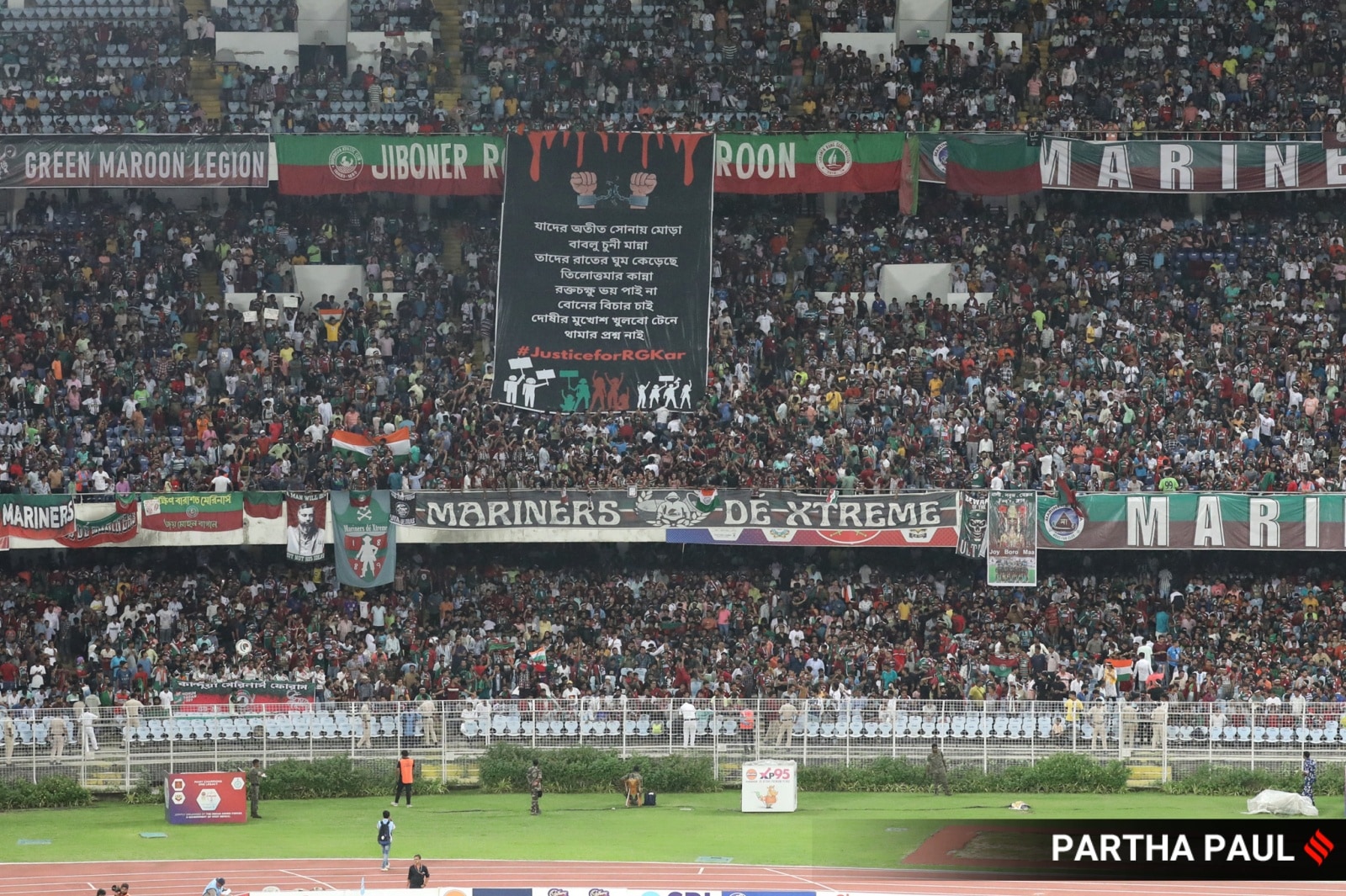 Football fans display a tifo at Salt Lake Stadium to protest against the alleged rape and murder of a junior doctor at RG Kar MCH during the Durand Cup final match between North East United FC and Mohunbagan Super Giant. (Express Photo)
Football fans display a tifo at Salt Lake Stadium to protest against the alleged rape and murder of a junior doctor at RG Kar MCH during the Durand Cup final match between North East United FC and Mohunbagan Super Giant. (Express Photo)
At a rally of domestic workers at Jadavpur in south Kolkata, Shyama Shikari, 42, made her first public speech in front of hundreds. She claims she was nervous but she “had to speak”. “I am raising a daughter too. I wanted her to be a doctor. But now I don’t. What if she were to meet the same fate?,” she says.
On September 8, Rishav Basu, 22, who graduated from college recently, participated in a rally of food delivery app riders to demand justice for the RG Kar victim. “I don’t think now is the time to take political sides. We are all here to be a part of something bigger than us,” says Basu.
It’s midnight at Shyambazar 5-point crossing, a junction that connects Kolkata with its far-flung suburbs. On regular days, people would stop by this late in the night only to make it in time for the last few servings of Golbari Mutton, one of Kolkata’s iconic eateries. But for a month, things have been different. The shop is metres away from R G Kar Hospital, the epicentre of the protests. On a Sunday night, thousands of cellphones are held up in the middle of the road for an impromptu dance performance, which will be followed by a poetry recital.



- 01
- 02
- 03
- 04
- 05









